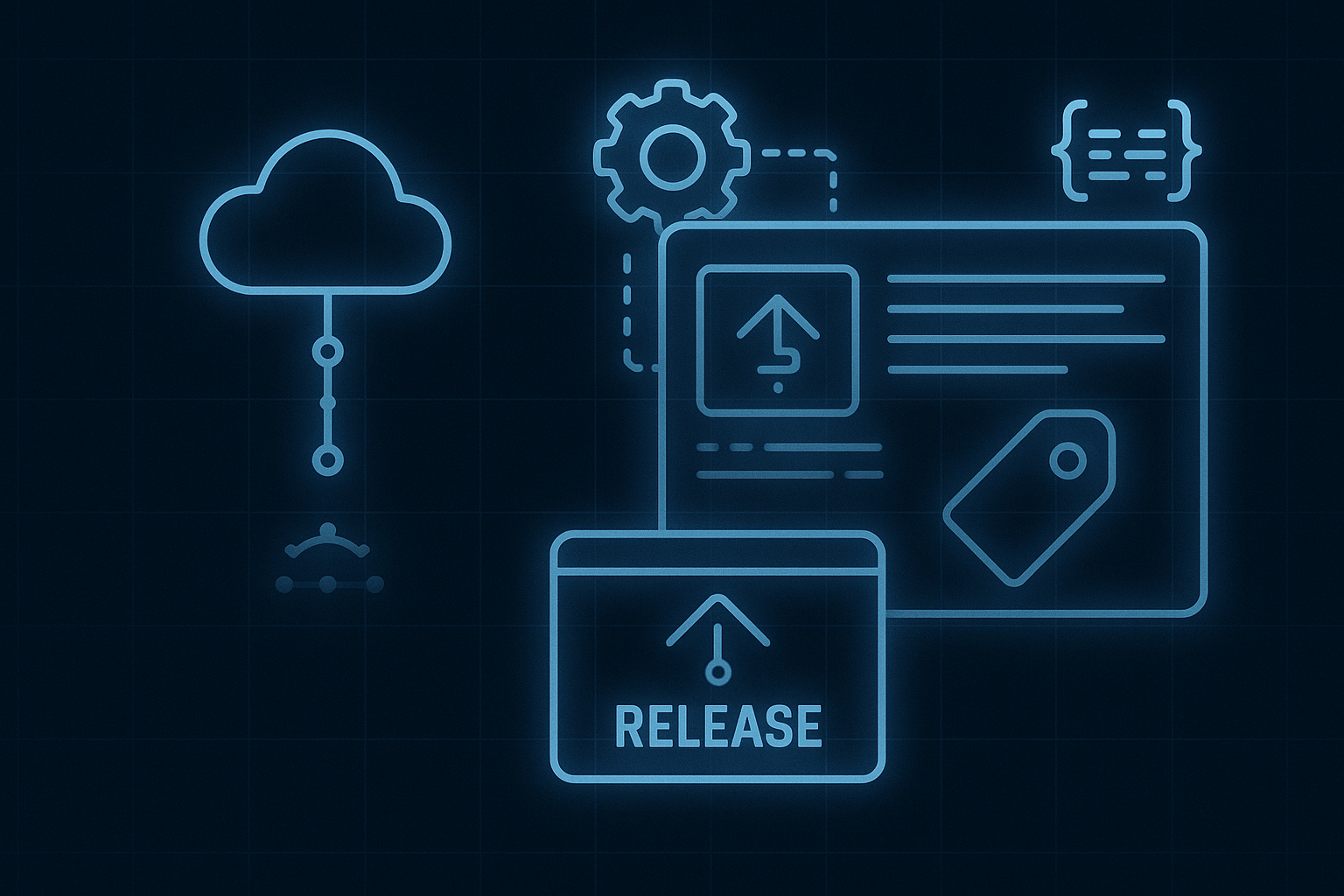DevOps: Automating Release Tags
Recently, I was tasked with developing a consistent strategy for managing releases and tags in a GitHub repository that had grown organically without any version tracking system. The repository had been accumulating features and fixes for months, but there was no way to track versions, identify what changes belonged to which release, or even determine what was the current deployed “version”.
The Challenge
In our project, we wanted to:
- Create clear versioned tags that followed semantic versioning (v1.0.0, v1.1.0, etc.)
- Automatically generate GitHub Releases from these tags, with proper release notes
- Avoid manual tagging or release creation
- Include a flexible way to bump major versions
The Solution
To achieve this, a GitHub Actions Workflow was implemented to handle tagging, and release management seamlessly. Illustrated below is the flow of the automated release process:
flowchart TD
A[PR Merged to Main] --> B[Get PR Metadata]
B --> C{Check for Major Triggers}
C -->|major label/keyword| D[Bump Major Version]
C -->|no triggers| E[Bump Minor Version]
D --> F[Create Git Tag]
E --> F
F --> G[Push Tag to Repo]
G --> H[Generate Release Notes]
H --> I[Create GitHub Release]
style D fill:#e74c3c,stroke:#c0392b,stroke-width:2px,color:#fff
style E fill:#27ae60,stroke:#229954,stroke-width:2px,color:#fff
style I fill:#3498db,stroke:#2980b9,stroke-width:2px,color:#fff
Key Features of the Solution
🔄 Automated Trigger
- Push to Main: Automatically runs after a pull request has been merged to the main branch
🎯 Versioning Logic
- SemVer Compliant: Follows semantic versioning principles and creates tag 1.0.0 if no previous tags exist
- Tagging: Reads the latest Git tag and increments the version, typically a minor bump but can also bump major or patch depending on context.
🏷️ Flexible Major Version Bumping
- Labels: Bumps the major version if pull request includes a major label
- PR Title/Description: Bumps the major version if the PR title or description contains
[major] - Commit Message: Bumps the major version if a commit message includes
[major]
📜 Release Notes Generation
- Changelog: It auto-generates changelog content for a GitHub Release based on the PR title and description
Here’s the GitHub Action that was developed to automate our entire release process:
1
2
3
4
5
6
7
8
9
10
11
12
13
14
15
16
17
18
19
20
21
22
23
24
25
26
27
28
29
30
31
32
33
34
35
36
37
38
39
40
41
42
43
44
45
46
47
48
49
50
51
52
53
54
55
56
57
58
59
60
61
62
63
64
65
66
67
68
69
70
71
72
73
74
75
76
77
78
79
80
81
82
83
84
85
86
87
88
89
90
91
92
93
94
95
96
97
98
99
100
101
102
103
104
105
106
107
108
109
110
111
112
113
114
115
116
117
118
119
120
121
122
123
name: Tag and Release on PR Merge
on:
push:
branches:
- main
jobs:
tag-and-release:
runs-on: ubuntu-latest
permissions:
contents: write
pull-requests: read
steps:
- name: Checkout code
uses: actions/checkout@v4
- name: Get latest PR merged
id: pr
uses: actions/github-script@v7
with:
script: |
const prs = await github.rest.pulls.list({
owner: context.repo.owner,
repo: context.repo.repo,
state: 'closed',
sort: 'updated',
direction: 'desc',
per_page: 1
});
const pr = prs.data.find(pr => pr.merged_at && pr.merge_commit_sha === context.sha);
if (!pr) throw new Error('No merged PR found for this commit.');
core.setOutput('pr_number', pr.number);
core.setOutput('pr_title', pr.title);
core.setOutput('pr_body', pr.body);
- name: Check for major release trigger
id: major_trigger
uses: actions/github-script@v7
with:
script: |
const prNumber = Number(process.env.PR_NUMBER || '${{ steps.pr.outputs.pr_number }}');
let isMajor = false;
if (prNumber) {
const pr = await github.rest.pulls.get({
owner: context.repo.owner,
repo: context.repo.repo,
pull_number: prNumber
});
const labels = pr.data.labels.map(l => l.name.toLowerCase());
if (labels.includes('major-release')) isMajor = true;
if (pr.data.title.includes('[major]') || (pr.data.body && pr.data.body.includes('[major]'))) isMajor = true;
} else {
// Fallback: check commit message
const commit = await github.rest.repos.getCommit({
owner: context.repo.owner,
repo: context.repo.repo,
ref: context.sha
});
if (commit.data.commit.message.includes('[major]')) isMajor = true;
}
core.setOutput('major', isMajor ? 'true' : 'false');
- name: Get latest tag
id: get_tag
run: |
git fetch --tags
latest_tag=$(git tag --sort=-v:refname | head -n 1)
echo "latest_tag=$latest_tag" >> $GITHUB_OUTPUT
- name: Bump version and create tag
id: bump_tag
run: |
latest_tag=${{ steps.get_tag.outputs.latest_tag }}
is_major=${{ steps.major_trigger.outputs.major }}
if [[ -z "$latest_tag" ]]; then
new_tag="v1.0.0"
else
IFS='.' read -r major minor patch <<< "${latest_tag#v}"
if [[ "$is_major" == "true" ]]; then
new_tag="v$((major+1)).0.0"
else
new_tag="v$major.$minor.$((patch+1))"
fi
fi
git config user.name "github-actions"
git config user.email "github-actions@github.com"
git tag "$new_tag"
git push origin "$new_tag"
echo "new_tag=$new_tag" >> $GITHUB_OUTPUT
- name: Check if major version
id: is_major
run: |
tag=${{ steps.bump_tag.outputs.new_tag }}
major=$(echo $tag | cut -d'.' -f1 | tr -d 'v')
minor=$(echo $tag | cut -d'.' -f2)
patch=$(echo $tag | cut -d'.' -f3)
if [[ "$minor" == "0" && "$patch" == "0" ]]; then
echo "major=true" >> $GITHUB_OUTPUT
else
echo "major=false" >> $GITHUB_OUTPUT
fi
- name: Generate release summary
id: release_notes
if: steps.is_major.outputs.major == 'true'
run: |
pr_title="${{ steps.pr.outputs.pr_title }}"
pr_body="${{ steps.pr.outputs.pr_body }}"
echo -e "# Release Summary\n\n**PR Title:** $pr_title\n\n**PR Description:**\n$pr_body" > release-notes.txt
- name: Create GitHub Release
if: steps.is_major.outputs.major == 'true'
env:
GITHUB_TOKEN: ${{ secrets.GITHUB_TOKEN }}
run: |
gh release create "${{ steps.bump_tag.outputs.new_tag }}" \
--title "Release ${{ steps.bump_tag.outputs.new_tag }}" \
--notes-file release-notes.txt
Conclusion
The beauty of this solution lies in its simplicity and reliability. Once set up, it runs invisibly in the background, ensuring that every meaningful change to our codebase gets properly versioned, tagged, and documented.
Have you implemented automated release management in your projects? I’d love to hear about your experiences and any creative variations you’ve developed!
